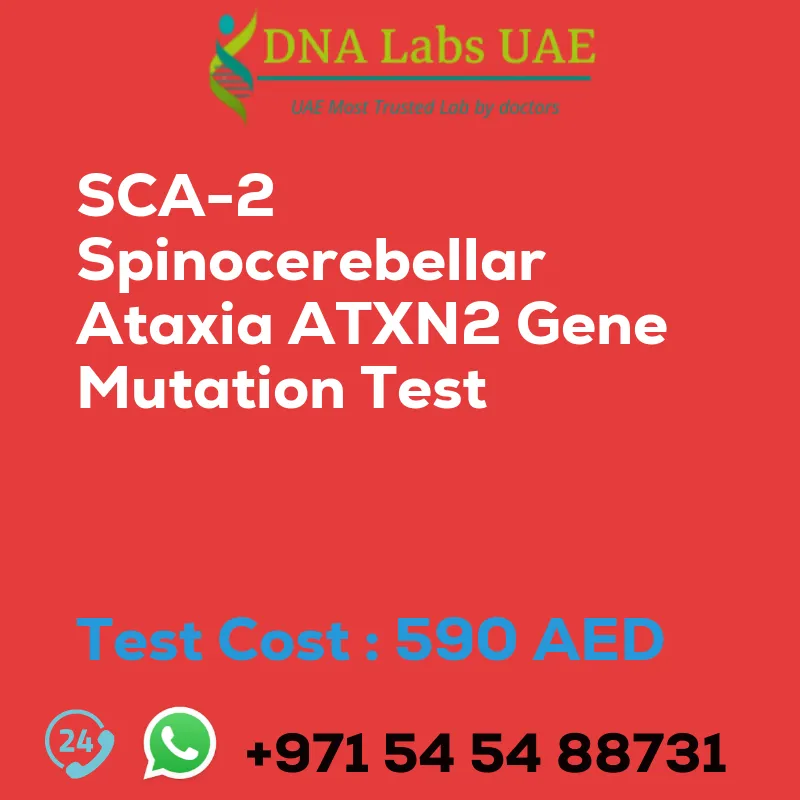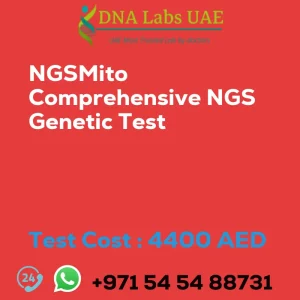SCA-2 SPINOCEREBELLAR ATAXIA ATXN2 GENE MUTATION Test
Test Name: SCA-2 SPINOCEREBELLAR ATAXIA ATXN2 GENE MUTATION Test
Components: ATXN2 Gene
Price: 590.0 AED
Sample Condition: 4 mL (2 mL min.) whole blood in 1 Lavender top (EDTA) tube. Ship refrigerated. DO NOT FREEZE. Duly filled Genomics Clinical Information Requisition Form (Form 20) is mandatory.
Report Delivery: SampleTue by 11 am; Report Sat
Method: PCR, Fragment analysis
Test type: Neurologic Disorder-Ataxia
Doctor: Neurologist
Test Department: MOLECULAR DIAGNOSTICS
Pre Test Information: Duly filled Genomics Clinical Information Requisition Form (Form 20) is mandatory.
Test Details:
The SCA-2 (Spinocerebellar Ataxia Type 2) test is a genetic test that detects mutations in the ATXN2 gene. Spinocerebellar ataxia is a group of genetic disorders characterized by progressive degeneration of the cerebellum and other parts of the nervous system, leading to problems with coordination, balance, and movement. The ATXN2 gene provides instructions for making a protein called ataxin-2. Mutations in this gene can result in the production of an abnormal ataxin-2 protein, which can accumulate in cells and interfere with their normal function.
The SCA-2 test involves analyzing a person’s DNA sample, usually obtained through a blood sample or cheek swab, to identify any mutations in the ATXN2 gene. This test can help confirm a diagnosis of SCA-2 in individuals with symptoms suggestive of the disorder, as well as identify carriers of the mutated gene who may be at risk of passing it on to their children.
It’s important to note that SCA-2 is an inherited disorder, typically passed down in an autosomal dominant pattern. This means that a person only needs to inherit one copy of the mutated gene from either parent to develop the condition.
The SCA-2 test can provide valuable information for individuals and families affected by SCA-2, allowing for early diagnosis, genetic counseling, and appropriate management and support. However, it is always recommended to consult with a healthcare professional or genetic counselor to fully understand the implications of the test results and discuss any concerns or questions.
| Test Name | SCA-2 SPINOCEREBELLAR ATAXIA ATXN2 GENE MUTATION Test |
|---|---|
| Components | *ATXN2 Gene |
| Price | 590.0 AED |
| Sample Condition | 4 mL (2 mL min.) whole blood in 1 Lavender top (EDTA) tube. Ship refrigerated. DO NOT FREEZE. Duly filled Genomics Clinical Information Requisition Form (Form 20) is mandatory. |
| Report Delivery | SampleTue by 11 am; Report Sat |
| Method | PCR, Fragment analysis |
| Test type | Neurologic Disorder-Ataxia |
| Doctor | Neurologist |
| Test Department: | MOLECULAR DIAGNOSTICS |
| Pre Test Information | Duly filled Genomics Clinical Information Requisition Form (Form 20) is mandatory. |
| Test Details |
The SCA-2 (Spinocerebellar Ataxia Type 2) test is a genetic test that detects mutations in the ATXN2 gene. Spinocerebellar ataxia is a group of genetic disorders characterized by progressive degeneration of the cerebellum and other parts of the nervous system, leading to problems with coordination, balance, and movement. The ATXN2 gene provides instructions for making a protein called ataxin-2. Mutations in this gene can result in the production of an abnormal ataxin-2 protein, which can accumulate in cells and interfere with their normal function. The SCA-2 test involves analyzing a person’s DNA sample, usually obtained through a blood sample or cheek swab, to identify any mutations in the ATXN2 gene. This test can help confirm a diagnosis of SCA-2 in individuals with symptoms suggestive of the disorder, as well as identify carriers of the mutated gene who may be at risk of passing it on to their children. It’s important to note that SCA-2 is an inherited disorder, typically passed down in an autosomal dominant pattern. This means that a person only needs to inherit one copy of the mutated gene from either parent to develop the condition. The SCA-2 test can provide valuable information for individuals and families affected by SCA-2, allowing for early diagnosis, genetic counseling, and appropriate management and support. However, it is always recommended to consult with a healthcare professional or genetic counselor to fully understand the implications of the test results and discuss any concerns or questions. |







